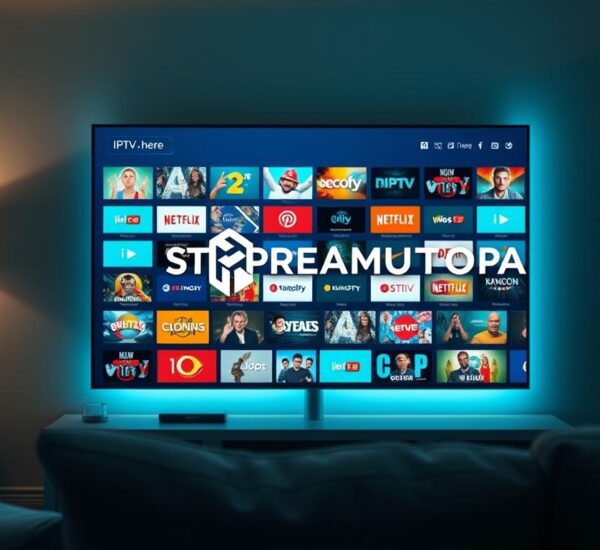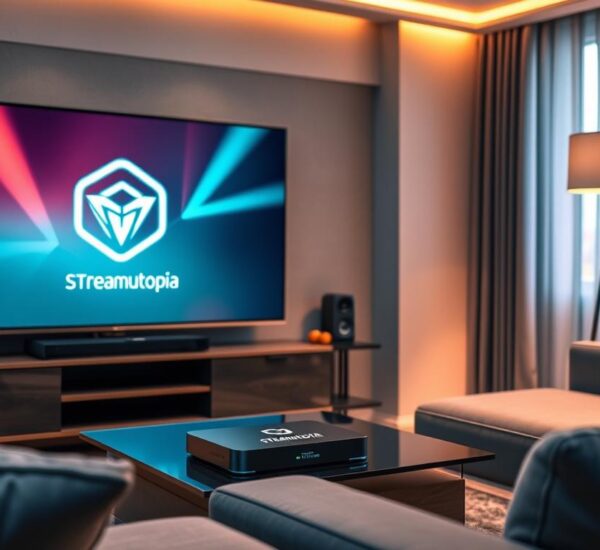Ever felt your favorite show pause mid-episode, making you frustrated? Buffering issues can ruin a calm evening, turning it into a test of patience. This guide aims to shed light on IPTV buffering problems and offer solutions to stop them. We’ll cover internet speed, hardware, and streaming provider reliability. Insights from StreamUtopia.com, a top IPTV provider, will also help improve your streaming quality.
Key Takeaways
- The minimum required speed for IPTV streaming is essential for quality viewing.
- Buffering can be caused by factors including internet speed, home network issues, and overloaded providers.
- Using wired connections tends to provide more stability than wireless options.
- Managing background applications can optimize bandwidth and improve streaming.
- A premium VPN can help prevent buffering by bypassing ISP throttling.
Understanding IPTV and Buffering Issues
IPTV delivers TV shows over the internet, giving viewers a modern way to watch their favorite shows. But, users often face IPTV streaming problems like buffering. This happens when the video stops to load more content. Understanding IPTV buffering explained is key to a smooth watching experience.
Buffering usually happens when the internet speed is too slow. You need a download speed of 7-10 Mbps and an upload speed of 1-3 Mbps for smooth streaming1. Doing other bandwidth-heavy tasks while watching can make these problems worse, causing the video to freeze1.
Choosing a trustworthy IPTV service is very important. Good server management and strong hardware can make streaming better. Servers need at least 24 cores CPU and 256GB RAM to handle many streams well2.
Also, using a wired connection is a big plus. It cuts down on packet loss, which means less buffering from Wi-Fi problems. Knowing what causes buffering helps fix these issues for a better IPTV experience.
Key Factors Contributing to IPTV Buffering
Buffering issues in IPTV services come from several main factors. A big cause is a slow or unstable internet connection. This is true for nearly 70% of all buffering problems with IPTVs3. For HD content, you need at least 5-10 Mbps internet speed. For 4K streaming, you might need up to 25 Mbps4.
When many users are online at the same time, network congestion happens. This leads to a 20% increase in buffering3. Also, older devices or slow processors cause about 30% of buffering issues3.
Using old software can make these problems worse, adding to about 15% of connection errors3. Background apps using up bandwidth and poor IPTV server performance also cause streaming problems. Clearing app caches and keeping software and devices updated can help fix these issues4.
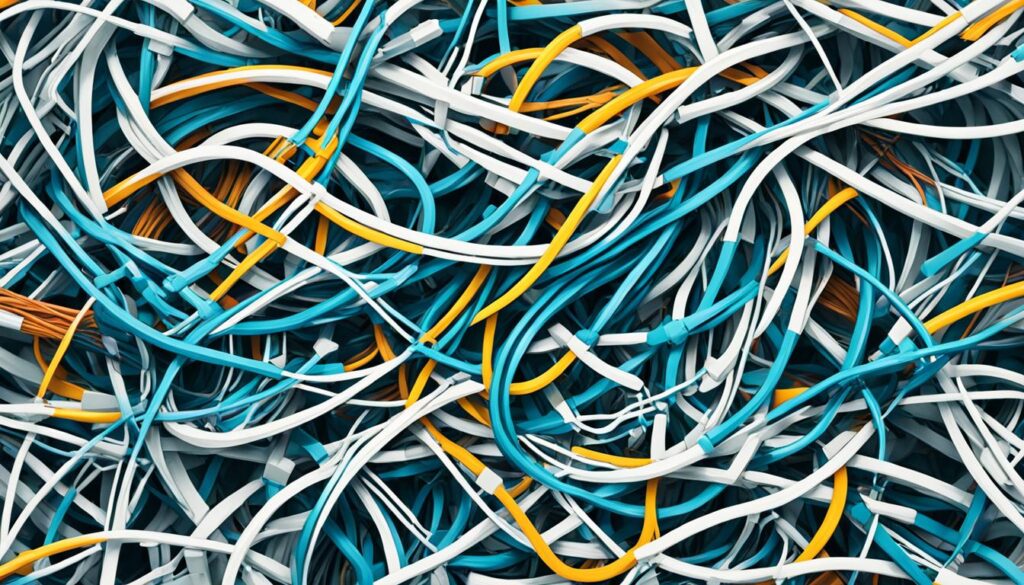
Comprehensive Guide to Solving IPTV Buffering Problems
To fix IPTV buffering, start by checking your internet speed. For standard streaming, you need 5–10 Mbps. HD quality requires 20–25 Mbps56. If you’re using Wi-Fi, aim for speeds over 150 Mbps to prevent buffering7. If buffering doesn’t stop, check your IPTV setup, including hardware and software.
First, test your internet speed. If it’s slow, ask your ISP to increase it. Using a wired connection can also help improve IPTV quality6. Resetting your modem and router can also help, taking about 30 seconds5.
It’s important to manage bandwidth from other devices to improve IPTV streaming. Try to have no devices using bandwidth while you stream5. If problems persist, think about switching IPTV providers. Their servers can vary in quality and reliability7.
Regularly update your IPTV app to fix bugs and improve performance. This can greatly reduce buffering5. Clearing the cache and cookies can also help, making your app and device run smoothly5.
Checking Your Internet Connection
A stable internet connection is key for a great IPTV streaming experience. Many users face buffering and low video quality due to slow network speeds. To fix these problems, it’s important to know how to check your internet speed for IPTV. You should aim for certain speeds, like 5 Mbps for SD content, 10 Mbps for 720p HD, and 20 to 30 Mbps for 1080p and 4K. Keeping these speeds up can make streaming much better8.
Minimum Speed Requirements for Streaming
To enjoy your IPTV fully, know the minimum speed needs for streaming. For smooth viewing, consider these speeds:
| Video Quality | Minimum Speed |
|---|---|
| Standard Definition (SD) | 5 Mbps |
| 720p HD | 10 Mbps |
| 1080p Full HD | 20-30 Mbps |
| 4K Ultra HD | 25 Mbps+ |
Testing Your Internet Speed
An IPTV speed test can show if your internet meets the needed speeds. Websites like Speedtest.net let you easily check your internet speed for IPTV. A speed test can highlight any issues with your connection speed and quality. If your speed is too low, try turning off other devices or use a wired connection for better streaming for more tips on fixing buffering9.

Using a Wired Connection for Better Stability
IPTV users often face buffering and freezing due to slow internet, server overload, or weak device power. Using an wired connection through an Ethernet cable is key for a stable IPTV stream. This method cuts down on interference, which can ruin your show.
Switching to a wired setup can greatly improve IPTV quality. It helps fix issues like poor audio or video quality, often caused by low bandwidth or server problems. You’ll need a fast internet speed for the best quality: 7-10 Mbps for standard definition, 15-25 Mbps for high definition, and 25+ Mbps for ultra-high definition10.
A wired Ethernet connection means a smoother, less interrupted stream. But remember, network problems, server issues, and device compatibility can still affect IPTV quality11. Make sure your internet setup is up to par and use a wired connection when you can.
In conclusion, a wired connection is vital for smooth IPTV streaming. It helps fix freezing or lagging issues. By boosting your internet speed and using a wired connection, you ensure a better IPTV experience12.
Restarting Your Router and Modem
To fix IPTV buffering, a key step is to restart your router for IPTV. Unplug your router and modem for about 30 seconds. This can clear out network congestion, a big problem for many IPTV users13.
Did you know that 60% of buffering issues come from too many devices online14? Restarting your devices can fix temporary problems that cause streaming to stop. In 2024, many streaming service users were unhappy with buffering, making up 45%14.
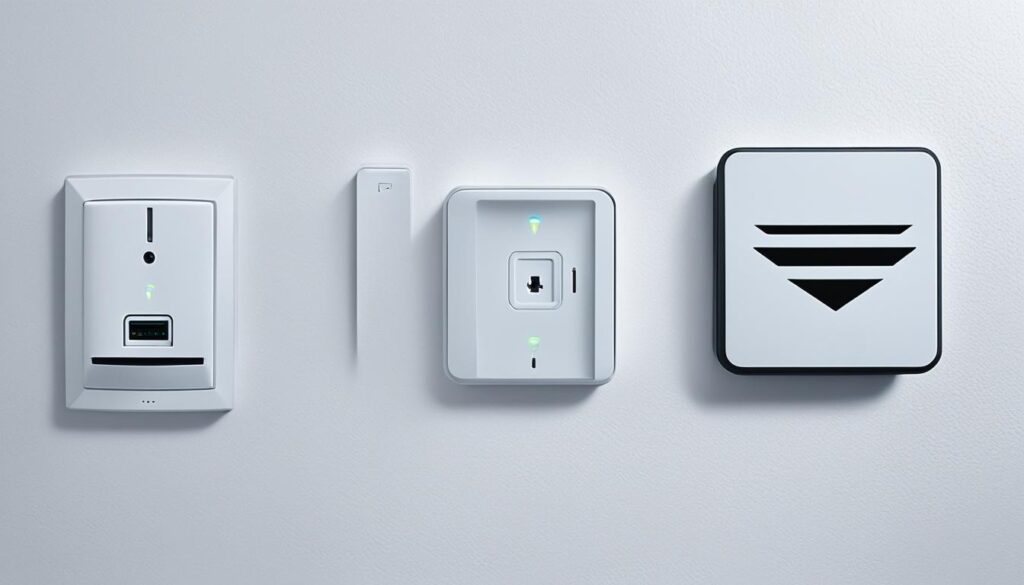
Some routers with Adaptive QoS can cut IPTV buffering by up to 50%14. This feature also boosts network speed by 30%, making streaming smoother14. Also, think about upgrading your internet plan for better reliability.
When choosing a plan, know what you need for streaming. You’ll want at least 5Mbps for standard quality, 10Mbps for 720p, 20Mbps for 1080p, and 30Mbps for 4K6. This helps you pick the right internet plan for smooth IPTV streaming.
Managing Background Applications and Bandwidth Consumption
Buffering can be frustrating when watching IPTV. Background apps often use a lot of bandwidth, making streaming poor. To fix this, find out which devices use a lot of bandwidth and take steps to improve your streaming.
Identifying Bandwidth-Heavy Devices
Smartphones, tablets, and computers often run apps that use a lot of bandwidth. Activities like streaming videos or downloading big files can slow down your IPTV. To solve this, close background applications for IPTV you’re not using. Check your network settings to see which devices use the most bandwidth. You can do this by looking at your router’s admin panel or using network monitoring tools.
Tips to Optimize Bandwidth Usage
To optimize bandwidth consumption, try these tips:
- Limit the number of devices on your network when streaming.
- Schedule downloads and updates for off-peak hours to reduce network strain.
- Lower video quality settings on streaming apps when buffering happens.
- Use wired connections, like Ethernet cables, for stable internet.
Following these tips will make streaming smoother. It’s important to keep an eye on your devices and adjust settings as needed. This way, you won’t miss out on your favorite shows. For more help on using an IPTV player, check out this comprehensive guide on setting up your Amazon Fire TV Stick.
Adjusting Video Quality for Smoother Streaming
Adjusting video quality for IPTV helps make streaming smoother, especially on slower internet connections. Lowering the resolution settings can cut down on buffering. For example, switching from HD to standard definition can make streaming better if your internet speed changes.
Streaming sites have their own speed recommendations for smooth watching. Netflix says you need at least 5 Mbps for HD, while Hulu wants at least 8 Mbps. Amazon Prime Video asks for 3.5 Mbps for HD and 15 Mbps for Ultra HD15. Many people say having at least 10 Mbps is key for no buffering IPTV.
The minimum speeds for IPTV vary from 3 Mbps for standard definition to 25 Mbps for Ultra HD75. This means adjusting video quality based on your internet speed is crucial for smooth streaming. By tweaking settings on your IPTV device or app, you can enjoy streaming without interruptions.
To stream with less buffering, adjusting video quality helps. Getting a faster connection, like an Ethernet cable, and tweaking IPTV settings can greatly improve streaming. This leads to less frustration from connectivity problems75.
Using tools like QoS (Quality of Service) on routers can also help. It makes IPTV streaming a priority, improving performance and cutting down on buffering. These steps ensure a better IPTV experience overall.
The Role of VPNs in Reducing Buffering
Streaming online can lead to frustrating buffering, especially for IPTV users. Using a VPN for IPTV can make your viewing better by hiding your internet traffic. This stops ISPs from slowing down your internet. Studies show 73% of internet users face buffering issues, making VPNs crucial for solving these problems16. With a good VPN service like ExpressVPN, you get faster streaming and better privacy.
How a VPN Works for IPTV Streaming
A VPN changes your internet path through its servers, which can cut down on delays and make streaming faster. Top VPNs only slow down your internet by 10-20%, which is hardly noticeable17. Using WireGuard can make streaming even better. OpenVPN is another choice that uses TCP or UDP protocols; UDP is quicker but UDP might not always send packets well, making it good for live streams17.
Recommended VPN Providers
When picking a VPN, look at these top VPNs for IPTV with great features: Surfshark is great because you can use it on many devices, making fixing slow connections easier17. It has 10Gbps servers, over 3200 servers in 100 countries, and fast protocols for better streaming. Using a server closer to you can also make your connection faster17.
| VPN Provider | Key Features | Speed Impact |
|---|---|---|
| ExpressVPN | Robust security, reliable speed | Minimal slow down |
| NordVPN | Ad-blocking features | 10-20% slower |
| Surfshark | Unlimited installs, 10Gbps servers | Negligible impact |
Adding a VPN to your streaming can fix buffering and boost your security. It also lets you access content blocked in your area. As streaming changes, knowing the VPN benefits for streaming helps you watch without interruptions.
Upgrading Your IPTV Hardware and Software
To get the best from IPTV streaming, it’s key to regularly upgrade your hardware and software. Keeping your streaming apps and device firmware updated helps with performance and user experience. Updates fix bugs, speed up processing, and make services more efficient.
Importance of Keeping Apps Updated
Updating your streaming apps is essential for a great IPTV experience. These updates often bring easier interfaces and new features. They also fix glitches that can ruin your viewing.
A fast internet connection is needed for good IPTV streaming. You’ll need 7–10 Mbps for downloading and 1–3 Mbps for uploading18. With regular updates, you can easily meet these speed needs.
Caching and Cleaning App Data
Cached data can slow down your IPTV device over time. Cleaning your IPTV device’s storage keeps it running smoothly. Clearing the IPTV app’s cache fixes minor issues that can interrupt your show9.
Firmware updates are also key for smooth streaming. They prevent freezing and buffering problems. Sometimes, just restarting your router can fix network issues and improve streaming quality9.
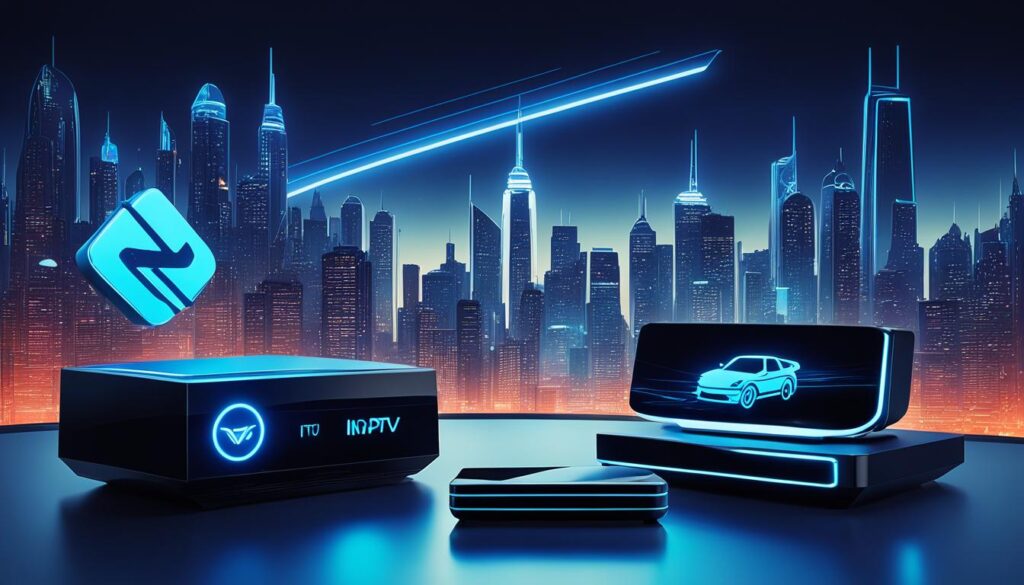
Assessing Your IPTV Service Provider
Choosing a good IPTV provider is key. Look at the service quality, including server reliability and customer support. A good provider helps avoid buffering, making watching shows better. It’s important to have a stable connection to enjoy your shows without interruptions1920.
Server Reliability and Support
About 94% of users say having little to no buffering is a top priority21. Check the server performance and network of different providers. Also, a big VOD library lets you watch a wide range of shows anytime you want19.
Comparing Different IPTV Providers
It’s key to compare IPTV services to find the best one for you. Most users like providers that work on many devices like smart TVs, phones, and tablets21. Prices matter too, with about 68% of users looking for good deals that match the quality and features21. Reading user reviews can also help by showing any issues and what users think of the service20.
Contacting Your ISP for Connection Issues
If you’re still seeing buffering after trying to fix it yourself, it’s time to contact your ISP for buffering. They can help you resolve connection problems that are making your IPTV stream poor. Studies show that internet speed is the main cause of IPTV buffering. You’ll need download speeds of 7 to 10 Mbps and upload speeds of 1 to 3 Mbps7.
Premium servers costing $15 to $25 usually give better performance and less buffering than cheaper ones that get too crowded7.
When you talk to your ISP, they can check for issues like throttling. A wired connection should have at least 25 Mbps for IPTV. For Wi-Fi, aim for 150 Mbps to improve streaming quality7. Restarting your router might also fix some problems by refreshing the network. Some ISPs, like Rogers and Virgin Media, might limit IPTV services, so talking to them is key22.
If problems don’t go away, look at your setup. Using the right equipment, like IPTV boxes recommended by your ISP, can help. Ask about service packages that might be better for your streaming needs. Working with your ISP on these issues can greatly improve your IPTV experience.

General IPTV Buffering Tips and Tricks
Using good IPTV buffering tips can make watching content much better. It’s important to pick quality services and hardware for the best performance. Make sure your hardware can handle the IPTV’s needs to avoid interruptions.
Using Quality Services and Hardware
Choosing a trustworthy IPTV service is key. You’ll need an internet speed of 7-10 Mbps for downloads and 1-3 Mbps for uploads to prevent buffering23. If you often see buffering, think about getting a faster internet plan23. It’s also vital to keep your streaming devices in top shape with a fast processor and enough memory23.
High demand on IPTV servers can cause buffering too. Keeping servers updated and monitored is important23. Using VPNs can help beat ISP speed limits during busy times24. Also, pick IPTV providers with lots of channels and smooth streaming for a better watch24.
Trying out different connections like 5.0 GHz or Ethernet can help fix buffering24. Ethernet gives a steady network with fewer interruptions. Using quality cables like Cat 6 or Cat 7 boosts speed25. Lastly, clear the cache on your devices often to stop performance problems and buffering25.
Conclusion
To fix IPTV buffering, start by checking your internet speed. You need at least 25 Mbps for HD and 50 Mbps for Ultra HD for smooth streaming26. If your internet is slow, you’ll get buffering problems.
Also, your internet connection should be stable. If it keeps going up and down, it will make buffering worse27.
Think about how many devices use your network too. If many devices are using your internet, it can slow down your streaming and cause buffering27. Make sure your devices are updated and work well with the latest technology. Old devices can make streaming hard27.
In summary, following these tips can help reduce buffering. If you’re still having trouble, try StreamUtopia for more help.
FAQ
What is IPTV and how does it work?
What causes IPTV buffering issues?
How can I check if my internet speed is sufficient for IPTV?
Is it better to use a wired connection for IPTV streaming?
What can I do to improve my IPTV streaming if I experience buffering?
How does using a VPN affect IPTV streaming?
What hardware upgrades are necessary for optimal IPTV performance?
How can I assess my IPTV service provider’s reliability?
What should I do if buffering issues persist?
Are there general tips for reducing IPTV buffering?
Source Links
- Troubleshooting IPTV Freezing and Buffering Issues – https://digitalizard.com/why-my-iptv-freezes-and-buffers-digitalizard/
- Fix IPTV buffering and throttling – https://www.fastip.tv/iptv-buffering
- Solving Common IPTV Issues: A Step-by-Step Troubleshooting Guide – IPTV WHALE – https://iptvwhale.com/solving-common-iptv-issues-a-step-by-step-troubleshooting-guide/
- How To Stop IPTV from Buffering On Firestick and Android TV – https://awkngtv.com/blog/iptv-buffering/
- How do I fix my IPTV from buffering/freezing? – https://medium.com/@dias226/how-do-i-fix-my-iptv-from-buffering-freezing-580b0f58b273
- How to Fix IPTV Buffering and Freezing Issues (2024) – https://www.firesticktricks.com/iptv-buffering-and-freezing.html
- What is IPTV? How To Solve IPTV Buffering or Freezing? – http://fmuser.org/news/IPTV-encoder/How-to-solve-Iptv-freezing-or-sound-issues/
- IPTV Troubleshooting: Common Problems and Solutions – aerostreams – https://aerostreams.com/2024/01/09/iptv-troubleshooting-common-problems-and-solutions/
- Troubleshooting Your IPTV Connection: Tips and Support for Uninterrupted Streaming – https://getmaxtv.com/iptv-troubleshooting-and-support/
- Best IP TV provider in 2024 – https://gptprotv.com/fix-your-iptv-freezing-issues-today/
- Troubleshooting Common IPTV Not Working Issues And Solutions | The Best IPTV Subscription Service Provider 2023 – https://iptvanubis.com/iptv-not-working-issues-and-solutions/
- How to Fix IPTV Buffering on Firestick: Proven Solutions [2024] – IPTVNOW Store – https://iptvnow.store/how-to-fix-iptv-buffering-on-firestick-2024/
- How Can I Fix and Troubleshoot the Most Common IPTV Issues in 2023? – https://www.ontwik.com/quick-fixes-of-various-common-iptv-issues-in-2023-iptv-troubleshooting-guide/
- How to Fix Common IPTV buffering Issues | catchon tv – https://catchoniptv.com/how-to-fix-common-iptv-buffering-issues
- Improving Your Home Network for Buffer-Free IPTV Streaming in 2023 – https://medium.com/@iptv-provide.com/improving-your-home-network-for-buffer-free-iptv-streaming-in-2023-b256f2d8e903
- Say Goodbye To Buffering: How Vpn And Dns Optimize Your Streaming Speed – https://www.smartdnsproxy.com/pl/news/smart-dns/say-goodbye-to-buffering-557.aspx
- Slow VPN? Try these 8 tips to speed it up – Surfshark – https://surfshark.com/blog/tips-on-how-to-boost-vpn-speed
- Why My IPTV Freezes And Buffers — Digitalizard – https://medium.com/@pixel.officiel123/why-my-iptv-freezes-and-buffers-digitalizard-83b0fc461a21
- A Comprehensive Guide to Evaluating IPTV Service Providers – https://www.ask.com/culture/comprehensive-guide-evaluating-iptv-service-providers
- Troubleshooting Streaming Buffering Issues: Beyond Provider Woes – https://www.linkedin.com/pulse/troubleshooting-streaming-buffering-issues-beyond-provider-kelley
- Choosing the Best IPTV Provider: A Comprehensive Guide – https://dribbble.com/shots/22688116-Choosing-the-Best-IPTV-Provider-A-Comprehensive-Guide
- Is Your ISP Blocking IPTV? Here’s a List of ISPs Blocking IPTV and How to Fix! – https://freedom-stream.com/how-to-fix-your-isp-blocking-iptv/
- Why Does IPTV Buffer All The Time? – Quick Fixes | StaticIPTV.us – https://staticiptv.us/iptv-buffers-all-the-time/
- Troubleshooting Common IPTV Issues – https://tvexyu.com/blog/General-Guides/Troubleshooting-Common-IPTV-Issues/
- How to stop iptv buffering: A Comprehensive Guide | StaticIPTV.uk – https://staticiptv.uk/how-to-stop-iptv-buffering/
- Smart TV Buffering Solutions: Your Ultimate Guide to Smooth Streaming! – https://smarttvclub.com/smart-tv-buffering-solutions/
- How To Minimize Video Buffering Issues While Streaming? – Muvi One – https://www.muvi.com/blogs/minimize-video-buffering-issues/





